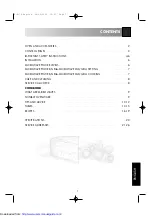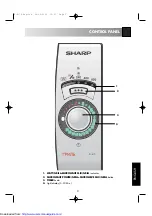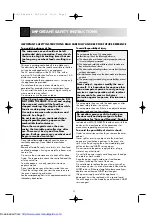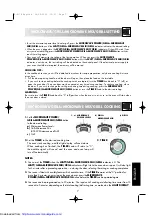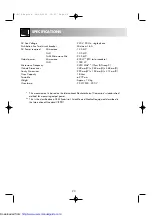
11
ENGLISH
TIPS AND ADVICE
TURNING
Medium-sized items, such as hamburgers and
steaks, should be turned over once during cooking,
in order to shorten the cooking process. Large
items, such as roasts and chickens, must be turned,
since the upper side receives more microwave
energy and could dry out if not turned.
STANDING TIME
Keeping to the standing time is one of the most
important rules with microwaves. Almost all foods,
which are thawed, heated or cooked in the
microwave, require a certain amount of time to stand,
during which temperature equalisation takes place
and the moisture in the food is evenly distributed.
BROWNING AGENTS
After more than 15 minutes' cooking time food acquires
a brownness, although this is not comparable to the
deep brownness and crispness obtained through
conventional cooking. In order to obtain an appetising
brown colour you can use browning agents. For the
most part they simultaneously act as seasoning agents.
In the following table you will find some suggestions
for substances you might use for browning and some
of the uses to which you might put them.
BROWNING AGENT
Melted butter and dried paprika
Dried paprika
Soya sauce
Barbecue and Worcestershire sauce, Gravy
Rendered down bacon fat or dried onions
Cocoa, chocolate flakes, brown icing,
honey and marmalade
Poultry
Oven baked dishes"Cheese
toasties"
Meat and poultry
Roasts, Rissoles, Small roasted
items
Oven baked dishes, toasted
items, soups, stews
Cakes and desserts
Coat the poultry with the
butter/paprika mixture
Dust with paprika
Coat with the sauce
Coat with the sauce
Sprinkle pieces of bacon or
dried onions on top
Sprinkle pieces on top of cakes
and desserts or use to glaze
DISH
METHOD
HEATING
●
Ready-prepared meals in aluminium containers
should be removed from the aluminium
container and heated on a plate or in a dish.
●
Remove the lids from firmly closed containers.
●
Food should be covered with microwave foil, a
plate or cover (obtainable from stores), so that
the surface does not dry out. Drinks need not be
covered.
●
When boiling liquids such as water, coffee, tea
or milk, place a glass stirrer in the container.
●
If possible, stir large quantities from time to time,
to ensure that the temperature is evenly
distributed.
●
The times are for food at a room temperature of
20° C. The heating time for food stored in a
refrigerator should be increased slightly.
●
After heating allow the food to stand for 1-2
minutes, so that the temperature inside the food
can be evenly distributed (standing time).
●
The times given are guidelines which can be
varied according to the initial temperature,
weight, water content, fat content or the result
which you wish to achieve.
DEFROSTING
Your microwave is ideal for thawing. Thawing times
are usually considerably shorter than in traditional
methods. Here are a few tips. Take the frozen item out
of its packaging and place on a plate for thawing.
Boxes and Containers
Boxes and containers suitable for microwaves are
particularly good for thawing and heating food, since
they can withstand temperatures in a deep freeze
(down to approx. –40° C) as well as being heat-
resistant (up to approx. 220° C). You can therefore use
the same container to freeze, thaw, heat and even
cook the food, without having to transfer it.
Covering
Cover thin parts with small strips of aluminium foil before
thawing. Thawed or warm parts should likewise be covered
with aluminium strips during thawing. This stops the thin parts
becoming too hot while thicker parts are still frozen.
Correct setting
It is better to choose a setting which is too low rather
than one which is too high. By so doing you will
ensure that the food thaws evenly. If the microwave
setting is too high, the surface of the food will already
have begun to cook while the inside is still frozen.
R-617R English 24/03/2003 10:21 Page 11
http://www.usersmanualguide.com/





